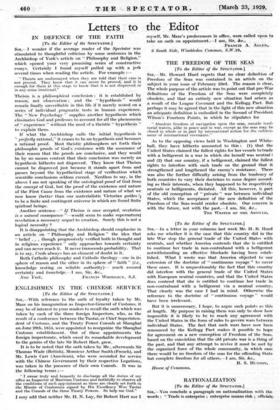Letters to the Editor
IN DEFENCE OF THE FAITH [To the Editor of the SPECTATOR.] SIR,—I wonder if the average reader of the Spectator was
stimulated to thoughtful criticism by some sentences in the Archbishop of York's article on " Philosophy and Religion," which opened your very promising series of constructive essays. Certainly 'I found myself pulled up with a jerk several times when reading the article. For example :—
" Theists are undismayed when they are told that their ease is not proved.. They know that it can never be proved: and- it-11 enough for them at this stage to know that it is not disprovCd or
in any sense irrational." • - • Theismis a philosophical cOnehision ; it is established by
„, not di , • reason, not ; and the "hypothesis ". would remain finally Unverifiable in this life if it merely rested on a
series of individual_ pragmatic tests in human experience. The " New Psychology " supplies another hypothesis which eliminates God and pnifesses to account for all the phenomena of "experience " without the need of a theistic " hypothesis " to explain them.
If !drat the Archbishop calls the initial hypotheSis is ' perfectly rational," it ceases to be an hypothesis and becomes a rational proof. Most theistic philosophers set forth their philosophic proofs of God's existence with the assurance of their reason that the proofs are conclusive, and they would be by no means content that their conclusion was merely an hypothesis hitherto not disproved. They know that Theism cannot be disproved just because it stands apart from and passes beyond the hypothetical stage of verification which scientific conclusions seldom exceed. Needless to say, in the above I am not speaking of the ontological proof of God from the concept of God, but the proof of the existence and nature of the:First Cause from the existence and nature of what we now know '(better than our materialistic Victorian guides !) to be a finite and contingent universe in which are found finite spiritual beings' Another sentence—" If Theism is once accepted, revelation is a natural consequence "—would seem to make supernatural revelations necessary sequel to creation. Surely this is not a logical necessity ?
It is disappointing that the Archbishop should emphasize in an article ,on `,` Philosophy and Religion " the idea that " belief . though progressively verified both in thought and in religious experience ',' only approaches towards certainty and can never reach it. It never transcends probability. That is to say, Credo always has an element of doubt in it.
Both Catholic philosophy and Catholic theology—one in its
sphere of reason and the other in its sphere of " faith" (i.e.,
knowledge resting on reliable authority)— reach assured certainty and knowledge.-1 am, Sir, &c.,
















































 Previous page
Previous page